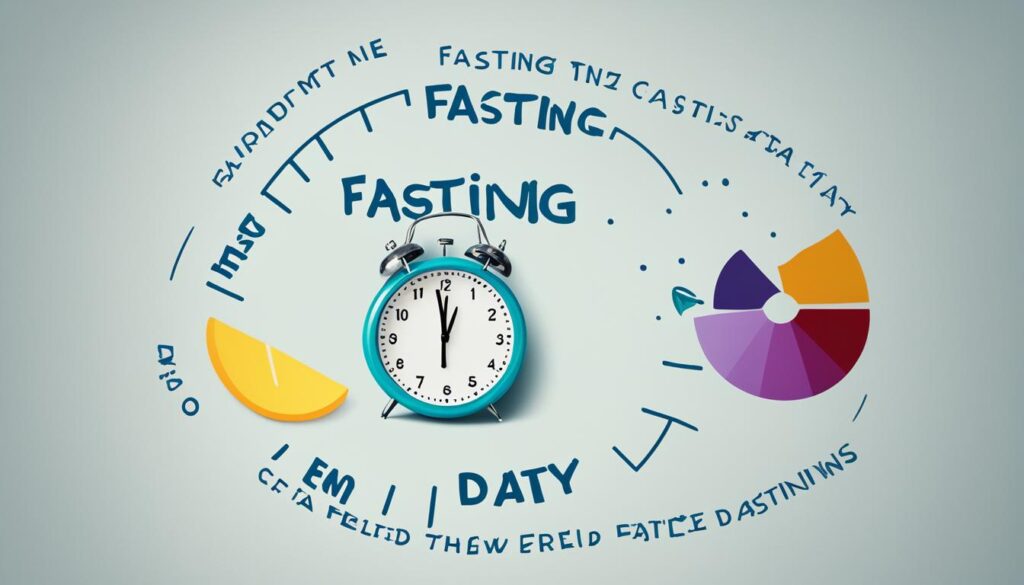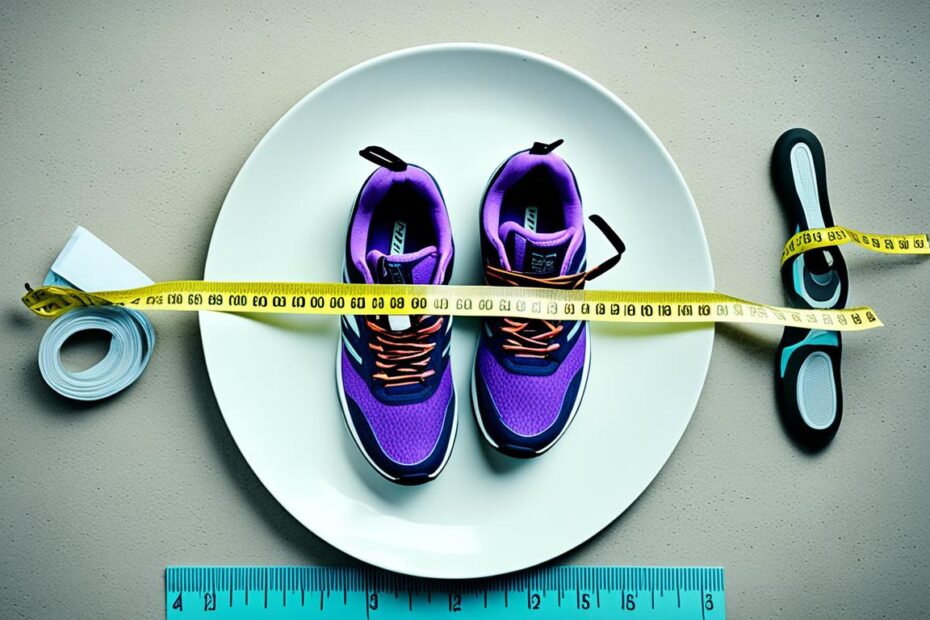Some think you can lose weight by not eating. Skipping meals may sound easy and ideal. But, it’s not the best way. Skipping meals can make losing weight harder. It might actually make you gain weight. Learn more here.
Intermittent fasting is a diet that’s become popular. It might not work for everyone, though. A study found most successful dieters eat breakfast every day. They lost weight and kept it off, shedding about 66 pounds.
Weight loss is really about the calories you eat each day. Our bodies work like complicated machines. If we skip eating, our body’s engine slows down, affecting weight loss. Think of it like saving gas by not starting your car. It’s not a good plan for the long haul.
The Science Behind Not Eating and Weight Loss
I’ve always wondered how not eating can help with losing weight. It seems our bodies are okay with short periods of no food. Studies say fasting now and then is good for the brain, the heart, and can help with diabetes and obesity.

How Your Body Responds to Fasting
Fasting makes our bodies change in many ways. After 8 hours without food, the body uses its own fat for fuel. This can help you lose weight. Insulin levels fall, which makes the body burn fat. Remember, fasting for a whole day might not be safe.
The Role of Metabolism in Weight Loss
Your metabolism is very important for losing weight. Fasting from time to time can make your metabolism work better. This might make you thinner and think clearer. But, it can take your body a few weeks to get used to this way of eating.
Understanding Calorie Deficit
Less calories than you need is key for weight loss. Fasting can help with this, but being too strict can slow your metabolism. It’s better to make small changes in what you eat and exercise often. This way, you could lose 1-2 pounds weekly in a healthy way.
Fasting is not good for everyone. Kids, pregnant women, and people with some health problems should not do it. Make sure to talk to a doctor before trying a new diet.
Intermittent Fasting: A Popular Approach to Weight Loss
Intermittent fasting has become a hot trend for shedding pounds. It’s all about timing your meals and not what you eat. Unlike other diets, this one is easier for many people to stick with.

- 16/8 method: Fast for 16 hours, eat within an 8-hour window
- 5:2 approach: Eat normally for 5 days, restrict calories for 2 days
It took me a few weeks to get used to this fasting routine. I drink water or zero-calorie drinks when fasting. When I can eat, I enjoy a diet full of veggies, lean meats, and good fats.
Studies show intermittent fasting does way more than help you slim down. It can boost your heart and how well you move. It might even turn around type 2 diabetes in some people.
But this fasting way isn’t fit for everyone. Always talk to a doctor before trying it, to see if it’s right for you. they can check if it’s safe and good for your health.
Can Lose Weight By Not Eating: Myths and Facts
Some say not eating helps you lose weight. It’s true that eating less can help. But, skipping meals is not a good idea. Let’s look at myths and facts about fasting and weight loss.
Short-Term Effects on the Body
When you stop eating, your body uses stored glycogen. This causes quick water weight loss. However, only 15% keep that weight off long-term. Staying healthy means not being extreme about it. Sustainable weight loss needs a balanced way.
Long-Term Consequences of Extreme Fasting
Not eating for a long time can hurt your health. Two days without food might make your body enter ketosis. This might seem good for weight loss. But it can make you lose muscle and slow down your metabolism. It’s better to focus on eating well and exercising for weight loss.
The Importance of Nutrient Balance
Fasting is risky because you might not get enough nutrients. The Dietary Guidelines for Americans say to eat a balanced diet. Include less than 10% of your daily calories from saturated fats. Also, have 3 servings of low-fat dairy daily. Remember, your body needs nutrients to work well, even during weight loss.
- Eat regular, balanced meals
- Include a variety of nutrients
- Combine diet with physical activity
A diet that’s good for losing weight has foods from all the food groups. And, you should exercise at least 150 minutes a week.
The Risks of Skipping Meals for Weight Loss
Many try quick weight loss through extreme steps. Skipping meals seems like an easy choice to cut calories. But, it can hurt your health. It might also stop your weight loss plan from working right.
Skipping meals can slow your metabolism. Your body acts like there’s not enough food. It holds onto fat. So, this makes it harder to lose weight.
Also, not eating can make you really hungry later. Then, you might eat more than you should. This can mess up your healthy weight loss plans.
Not eating well can cause you to miss important nutrients. Your body needs lots of things to be healthy. Skipping meals can keep you from getting these.
- Increased risk of gallbladder problems
- Higher chance of heart disease
- Potential for heart arrhythmias
- Risk of hypoglycemia (low blood sugar)
Fasting isn’t for everyone when trying to lose weight. It’s bad for people with certain health issues. These include eating disorders, type 1 diabetes, or if you’re pregnant, nursing, or under 18. For them, the risks are too high.
Choose eating a balanced diet over skipping meals. This helps you lose weight safely. Plus, it keeps you healthy!
Healthy Alternatives to Not Eating for Weight Loss
In my search for healthy weight loss, not eating wasn’t the best choice. I’ll share some strategies that work without starving.
Balanced Diet and Portion Control
A balanced diet with the right portion sizes is crucial for losing weight. High-protein meals boost your metabolism. This means you burn more calories even at rest.
Using smaller plates tricks your mind into thinking you’ve eaten more. And remember, a palm-sized serving of meat or fish is enough.
Regular Exercise and Physical Activity
Exercise is important for losing weight and staying healthy. Try to be active for 150 minutes every week. You don’t have to do it all at once; split your activities throughout the day.
Working out regularly not only burns calories. It also speeds up your metabolism. This helps make losing weight more manageable over time.
Mindful Eating Practices
Being mindful about what and how you eat really helps with weight loss. Pay attention to your food. Notice when you’re full to avoid overeating.
Eating slowly is a good habit because it helps you enjoy your food more and feel full. It also prevents you from eating too much. Try having smaller, more frequent meals to keep your metabolism active.
